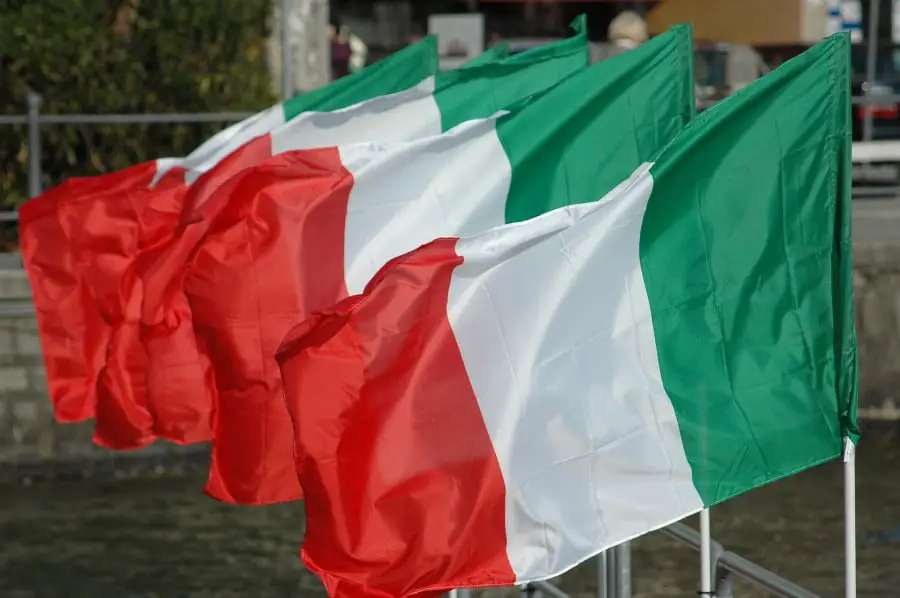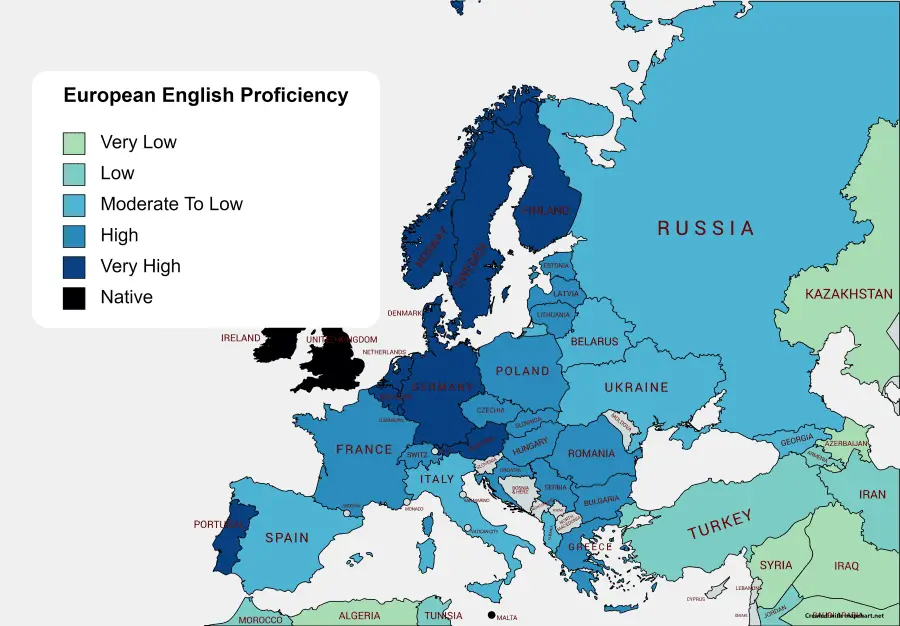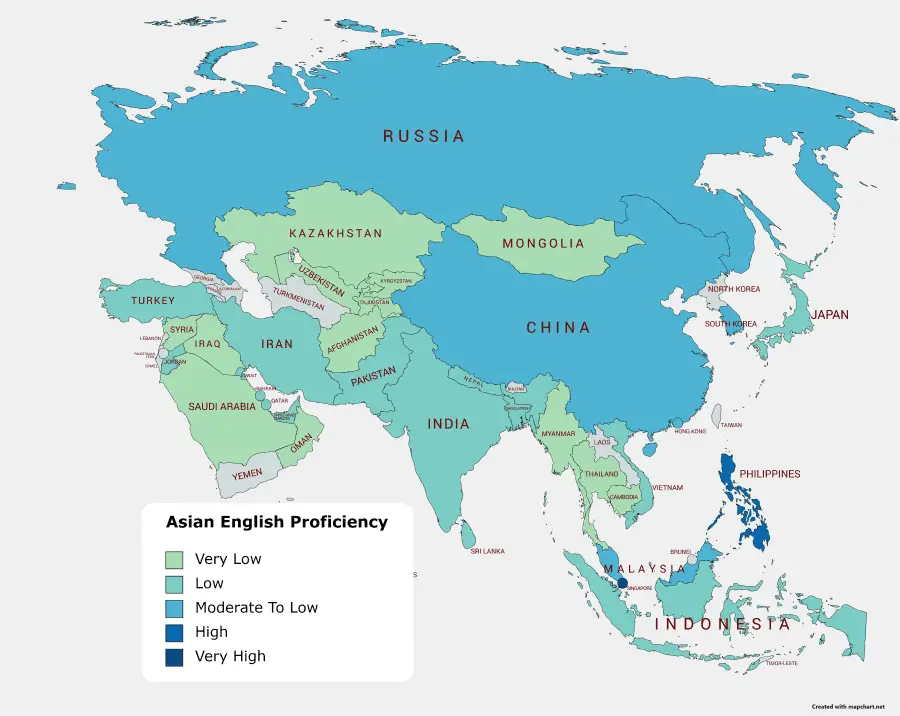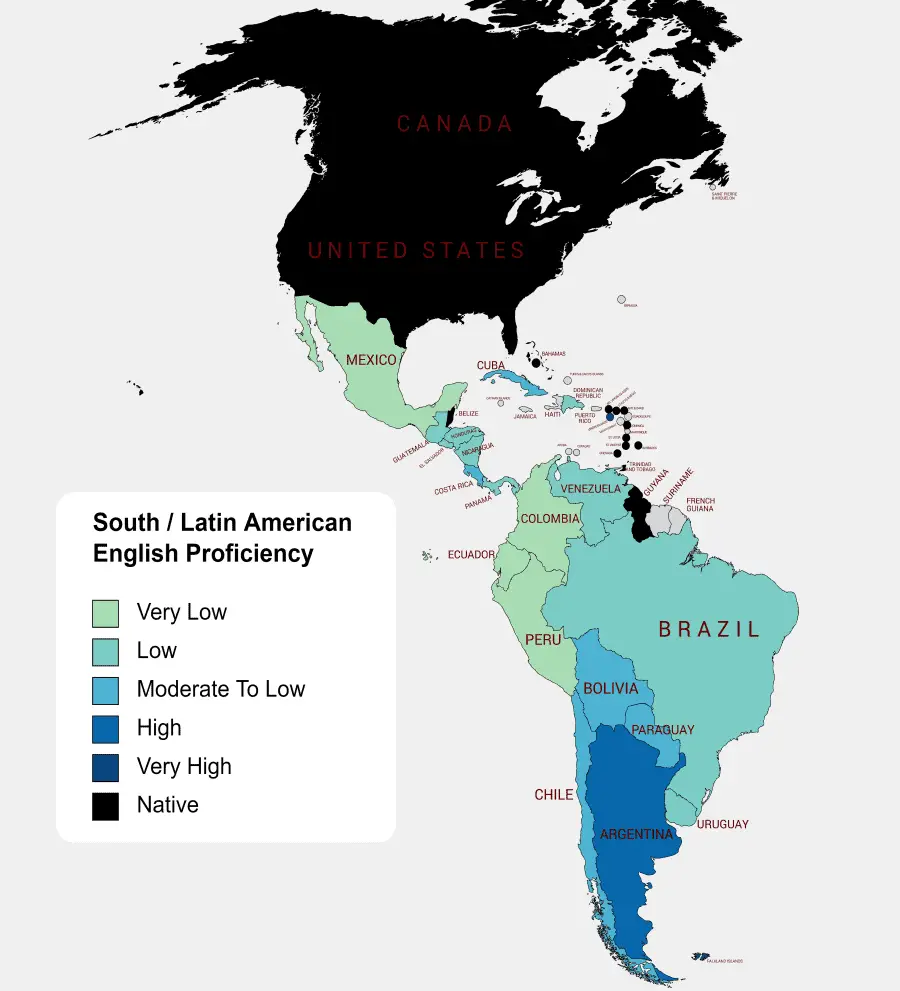If you visit Vatican City in the middle of Rome, try to settle in for a semester abroad at the University of Bologna, or are on a business trip to Lombardy, would you be able to get along with only English? Whether you are from Australia, Great Britain, or the U.S. the answer concerns you if you are traveling to Italy or even doing business with Italian firms online.
English is not widely spoken in Italy as a whole. 73.5% of European countries have better English skills than Italy. The exceptions are around universities, tourist destinations, and the larger city centers like Rome, Milan, Naples, and Turin. Though, the numbers don’t tell the whole story.
According to the EF English Proficiency Index Italy is ranked #25 out of 34 countries in Europe for English language proficiency. They are ranked 30th in comparison with the world’s top 100 countries that have English speaking populations. Why would they be designated as low to moderate in their overall spoken English proficiency? Read on to find out.

Contents
- 1 How Commonly Is English Spoken in Italy?
- 2 How Italy’s English Proficiency Compares To Other Countries And Regions
- 3 Larger Cities In Italy Have More Widely Spoken English
- 4 English Spoken In Smaller Italian Municipalities
- 5 Is Spoken English Heard On Italian Television And Movie Screens?
- 6 English In The Italian Workplace
- 7 Is There English On Public Transportation And Street Signs?
- 8 Why Is English So Uncommon In Italy?
- 9 Do I Need To Learn Italian?
- 10 How To Find English Help In An Italian City
- 11 The Final Talking Point on How Common is English Spoken in Italy
How Commonly Is English Spoken in Italy?
Italy is one of the most monolingual countries in Europe. Can you find English there? Sure you can. It will just be more difficult and when you do it will be much harder to understand than other places in Europe.
Italians are not particularly adamant that others speak Italian either. As a culture and a country, they simply see learning foreign languages as a low priority and according to a special report on the multilingual status of European countries, they are one of the countries with the highest opinion of having all of the EU speak one common language.
Though they don’t think that a common language for the EU necessarily has to be Italian, they overwhelmingly believe there should be one.
How does English fit into their society, when is it used, and where are we most likely to find English? Italy is a country with very different geography, culture, and even language from one end of it to the other. We will look at all of these characteristics and more as we explore how common or widely spoken English is in Italy.
How Italy’s English Proficiency Compares To Other Countries And Regions
English in Italy is a low priority like most other second and foreign languages. Italians do have regions that speak other languages. For instance, the autonomous area known as South Tyrol sits just below Austria at the base of the Alps. The main spoken language there is German.
This is not to say that the people in this region are all that different than other Italians in their pursuit of multilingualism. They just speak German and have done so for many generations. Much of it has to do with their connection to their German speaking neighbors to the north.
Italians are content with being one of the more monolingual countries of the region. Even if their language happens to be German, it still is perfectly okay with them. The English skills in Italy are in even worse shape than they are in France. You can find English, but it will be usually take a bit of work and the level will more than likely be low.
If you would like to see how common or widely spoken English is in France, see my article here.
Italian English vs The Rest Of Europe

With much of Europe’s English language skills on the rise, Italy is noticeably behind. 73.5% of the rest of Europe have better English skills than Italians. This is not terribly surprising seeing its location in southern Europe and parts of the country being geographically far from the native English speaking UK.
Though there is more to the reluctance of Italians to speaking English than simply geography. As a tourist or even a business traveler, Italians may put out a little more effort in the more English friendly tourist locations, major cities, and near universities to speak with you in English. Yet, in their day to day lives they are some of the least likely in Europe to read, listen to, or watch anything in English.
English in Italian Day to Day Life
Even of those in the country that have some level of English, 63% of them admit that they only use it on rare occasions. This gets even more stark when asked in polls whether they listen to the radio, watch television, or see movies in any foreign language. Only 15% of people in Italy say they do any of these activities in any other language with English being grouped in with all the rest.
English For Italians At Work
Another indicator of the view of foreign languages in general in Italy is their thoughts on the necessity to learn another language to work abroad. Out of all the countries in Europe that were polled (and they polled most every one of them) they were the only country that had less than 10% (9% to be exact) of their population think that working abroad was a good enough reason to learn any foreign language.
Do Italians Read In English?
The passive ability of reading, the easiest of most foreign language activities still fares no better in Italy. When reading things like books, magazines, or newspapers Italians are some of the least likely in Europe to do it in any other language than their native one. Only 13% of them say they do this on any level. Only Poland is less likely to use foreign languages in reading and English is only one of the languages considered.
Italian English vs Asia

As with many things in life, context is king. The story changes dramatically if we switch from comparing Italy’s use of English with the rest of Europe to analyzing it along side English proficiency in Asia. Italy seems quite multilingual in comparison with many Asian countries.
Italian English vs Larger Countries In Asia
Italians use English on a more wide spread and higher level than most of these countries, with the notable exceptions being Russia, China, South Korea, and the Philippines. The ties these countries have with the United States, their proximity to Australia, or their position on the world political scene accounts for much of their English proficiency.
Italians And The Japanese Have Similar Views On Culture And Language
One notable exception in this area is Japan. Like Italy, they have a strong sense of their own identity and culture. This is also directly connected to language. In the United States many believe that their is no distinct culture. This is actually not true. There is a distinct ‘American’ culture and the way we speak English is inextricably linked to it.
This same thing happens in countries like Japan and Italy. They speak less English because for one, they are less affected by media and entertainment from the United States. Italy in particular speaks more English than most not because of the affects of cultural importation, but simply because it is located in Europe with a large portion of its neighbors speaking it. Like Japan though, they have resisted where others have not.
Italian English vs Latin and South America

It should be noted that when looking at the levels of English in Italy from a country like the United States that Italy is a multilingual giant when compared with non-immigrant populations in the U.S. Much of the situation geographically can explain this with issues of the size of the countries and their locations.
Italy Has More English Skills That Most In Asia Or Central And South America
When speaking directly about English levels, how does Italy compare with other parts of the world that have measurable levels of English proficiency? When compared to the Americas the same picture as with Asia emerges.
Compared with the countries of central and South America, Italy fares pretty well in English proficiency. The largely Spanish speaking (Portuguese in Brazil) countries tend to have less conversational level English speakers than Italy in most every case. The exceptions, other than native English speaking countries are Bolivia, Chile, Paraguay, and Argentina.
Italy’s English Level Is Actually Ahead Of The Curve
A picture emerges about the English you will find in Italy when compared with the rest of the world and not just Europe. In comparison with many of the countries in Europe, Italy lags behind in English. Yet, when looking at the Italians along side other continents and areas around the globe, they are actually ahead of the curve.
We will look at where to find English in Italy next, but for here we can say that compared to Asia and the non-native English portions of Central and South America, Italy is a more likely place to find English than most.
Larger Cities In Italy Have More Widely Spoken English
With Italy being in the top five of the most visited countries in the world year after year, it is little wonder that there are areas that will have more levels of English than others. The tourist and most popular visited destinations will tend to be the ones with much more English.
There is also the influence of the younger generations and those in the halls of higher education. A much higher percentage of people in these categories tend to speak and understand English. With many universities of varying sizes throughout the country, Italy can be a good place to find English if near one of these areas.
There is also some international trade and business that can bring the need for English as well. Some locations are more likely than others to offer business professionals the ability to use their English.
English In Rome
Population 2,895,206 – As the seat of Catholicism and the former center of the Roman Empire, Rome is one of the most visited cities on the planet. This in and of itself makes Rome one of the easier places to get around if English is your only language. The city has a large economy designed around tourism and this means many languages will be usable, English being one of them.
For those looking for English, the presence of Sapienza University of Rome is a great opportunity to find it. The populations around universities will be much more receptive to learning and speaking English. English has become the language of scholarship in many fields. This coupled with younger age groups being more open to foreign languages makes this possible.
The business climate of the capital of Italy is understandably more international than others may be. This is also combined with the diplomatic and governmental influence of other English speaking nations. For these reasons, even in a business or political setting, English will be more common than in other parts of Italy.
English In Milan
Population 1,437,436 – The unofficial fashion capital of the world, Milan has international ties to the New York, Paris, and many other cities around the world that make fashion their industry. This is not the only draw to the city of course, but this in itself breeds the need for English.
University of Milan has the distinction of being one of the largest universities in Europe. It boasts a student population over 61,500 students. This amount of college students combined with the total population and tourism creates a good environment for anyone seeking to get around only using English.
Milan’s Exhibition Center complex is one of the more famous in the world with its fashion and textile based trade shows. The international environment invites the English language and those wanting to do business in English in many related fields. But, without a doubt, one of the major industries in Milan is tourism. With tourism comes English.
English In Naples
Population 962,736 – With this being the third largest city in Italy and its southern industrial capital and powerhouse, it is no wonder that it may be easier to find English in this business setting than other smaller cities and less production oriented towns. Though tourism reigns as one of the larger portions of the Naples economy, industry does play a part.
University of Naples Federico II established in 1224 A.D., boasts a jaw dropping 83,542 students, making it one of the largest universities in the world. If you have been paying attention thus far, you know that where there are university students, you will find higher numbers of English language speakers and greater proficiency. Naples has other sizable universities as well, which makes the city more navigable than many others for English only travelers.
Naples is the birthplace of Pizza and there is no better place to get your hands on an original slice than in the Piazza del Mercato. This 13th century attraction and others in this ‘gritty city with soul’ makes English much easier to find because of the influx of tourists. To find English in most countries where it has some presence, the most success will inevitably be around these tourist areas.
English In Turin
Population 870,599 – This city lies in the foothills of the Alps and sports several palaces, museums, and an attractive city center filled with cafe’s and higher end boutiques. The ‘Shroud of Turin’ is also a major religious draw for Catholics along with its churches. The tourist feel here is laid back, but is alive and well. This offers ample opportunity to use English as a tourist, short term student, or business traveler.
With a college campus known as one of the major universities in the world, University of Turin claims over 64,000 students and holds a major influence over the population of the city. With this number of college aged students, the English in and around the campus will be possibly higher than other locations.
The suburbs around the city are home to industry and production. You will find plants and factories making products like FIAT automobiles. This makes it more of an international trade city. Even if it is not a center of international business for all of Italy, it will have some level of English due to trade with English speaking countries.
English In Palermo
Population 658,037 – From the wine tasting to the street food markets Polermo holds a special draw for the tourist crowd. Its western suburb is also one of Italy’s most scenic and idyllic seaside towns. English is more prominent when there is a strong tourist presence. Palermo situated on the island of Sicily definitely has its share.
University of Palermo is an urban campus that has nearly fifty thousand students. With the presence of this many students and affinity for English in higher education, anyone wanting to speak English or needing assistance will have a easier time finding it here than in other places.
Palermo’s industrial sector is dominated by ship repair and the production of products such as chemicals and glass. It is also a center for the island’s agricultural market. With its central location in the Mediterranean Sea and the types of business it engages in, there is some chance that English could be found in its professional environments.
English In Genoa
Population 571,107 – In the 12th and 13th centuries this city was the major port city in the Mediterranean. What does this mean for today? Tourism. This is still a major port city with cruse lines and shipping. It is also a center for history buffs and those seeking to reclaim their Italian roots. It isn’t hard to imagine that tourism of this kind will create more of a need for the English language.
With a student population of 33,650, the University of Genoa contributes to the city’s English speaking population nearly as much as the cruise lines, shipping, and employees at tourist spots. From the English language classes to the general acceptance of English in many scholarly disciplines, the language holds a place in many undergraduate and graduate level environments.
As mentioned before, this is a major port city for Italy and its trade throughout the Mediterranean. Shipping brings international trade and tourism. Both of these create an environment for business English, even if it may be limited in scope.
English In Bologna
Population 395,602 – The Porticoes of Bologna are listed by the UNESCO world heritage convention and are a major architectural pull for tourists in the cities older quarters. These symbols of aesthetic pragmatism draw English speakers along with the many other tourist sites in the city.
The University of Bologna is the oldest university in the world today. It has been in continuous operation since its founding in 1088. Before this it was a Cathedral School of the Catholic Church. Here you will find the rich history and highly prized intellectual atmosphere noticeably English friendly.
Bologna is an industrial hub for Italy with its automotive, food, and mechanical parts production. These are items that the Italian people ship all over the world. Where there is international trade, there is a higher presence of English.
English Spoken In Smaller Italian Municipalities
Though the industry, businesses, and governments of these less populated areas may not be on the international scale, there are still two areas that put these three smaller cities on the world map when it comes to English speaking. One is the presence of a major university, and the other is the enormous tourist draw that these Italian towns hold.
English In Florence
Population 375,612 – From the Duomo, with its renaissance dome sitting on top of a gothic cathedral, to Michelangelo’s library of San Lorenzo, and everything in between this is a tourist haven. The tremendous amount of historical architecture in the city brings many English speaking tourists to these areas and requires at least some level of proficiency on the part of the employees and shop owners that service them.
The University of Florence has 50,173 students or thereabouts each year. The climate in this size of university for English is good and those students living, working, and shopping out in the city brings it into this smaller city at levels that it normally would not see.
English In Verona
Population 261,411 – The famed backdrop of Shakespeare’s Romeo and Juliette, Verona is a popular tourist spot with its cobblestone streets, Roman amphitheater, and many churches. Though in this smaller city English may be harder to come by, the tourist attractions will offer some help in this area.
The University of Verona can be of some help for those seeking English speakers. The college boasts a student population of nearly 27,000. This alone can offer the person seeking English for aide or even practice a central place to find it.
English In Venice
Population 258,600 – The Venice canals are world famous for tourists, movie makers, and even as backdrops for authors. This city has become mostly a tourist center with many of the old town residents forgoing the high expense of maintaining the buildings and managing the water levels. This makes it a prime location to find spoken English.
Ca’ Foscari University of Venice is home to around 19,000 students each year and gives ample opportunity to find spoken English in a small city that already will have its fair share.
Is Spoken English Heard On Italian Television And Movie Screens?
Dubbing films is a tradition in Italy spanning all the way back to the emergence of sound from the silent film era of the 1920’s. The loud cameras and equipment on set simply didn’t allow for live voice and sound to be recorded. Dubbing a voice over a scene shot where the sound quality may be sub par still happens today in Hollywood on nearly every film or show.
When it comes to English films in Italian movie theaters or on streaming services, Italian is nearly always dubbed over the English voices. This comes from the lower English proficiency of the population and the overwhelming levels of Italian spoken in most households.
Captioning over English voices is not only less popular overall for movie goers and series bingers, it is especially the case in Italy. When movies with sound were first introduced to the Italian population, a majority of them were illiterate. Today this is not the case, but the lack of desire to read their entertainment and low levels of English make it financially profitable for media companies to dub nearly everything played on small and large screens in Italy.
English In The Italian Workplace

When asked in a European wide study, only 13% of employees and bosses alike in Italy said they used English in any regular manner in the workplace. This is not surprising when attitudes toward foreign languages in general in Italy are compared with other European countries. There are a wide range of languages all around them, but they are simply not interested.
This is not always the case for certain. In many multinational companies English may be necessary to do business with English speaking countries. The point is that other than international business dealings and tourist related industry personnel, English is simply not that widely spoken in the Italian workplace.
Is There English On Public Transportation And Street Signs?
In many countries the universal red octagon ‘Stop’ sign has been adopted. They will often times even print the word in English because of its international recognition. This is also the case in Italy. Yet, this is about where the English stops on any form of Italian signage.
The good news is, that like many countries Italy has used for many years the pictograph style of road signage. This was done around the world to overcome illiteracy rates in various populations until these levels could be raised. This means that not only is there not much English on the road signs in Italy, there is also not much in the way of Italian either.
You will find the more directional signs are in Italian, but rarely will you find English. These are usually understood by speakers of any language with just a few simple words in Italian and knowing the road sign symbols.
Why Is English So Uncommon In Italy?
Mostly the reasons behind the lack of English proficiency in Italy are simple. There is a mix of cultural adherence, tradition, and an aged population at play. In older more traditional populations that have not been influenced by a more globalist mindset, national identity is important. With this comes adherence to the language that holds the most ties to the predominate culture.
English is not the only one. Italians don’t learn other languages either. One of the top languages learned as a foreign language in Italy is English. Its lack of use in the country spells trouble for others. It is not seen as a necessary skill to have even in modern times.
With younger generations this is changing however. As statistics show, the majority of high school students are actually learning English. The proficiency scale in Europe is standardized and even the level of Italian students on this scale is achieving high marks.
Is it any wonder that Italian universities are one of the best places to find English spoken?
Do I Need To Learn Italian?
The answer we always give to a question like this is… If you are interested at all in learning a foreign language then, yes! Learning languages not only helps your brain, it also has many benefits too numerous to list here.
Here are a few of my articles that may help you understand the significance of language learning…
- How Language Learning Affects The Brain
- Ways Language Learning Can Increase Mobility
- This Is The Best Time To Start Language Learning
- Do You Have To Be Smart To Learn A Language
Basic Italian Words And Phrases For English Speakers
There are some basic phrases that you can learn in Italian to suppliment your attempts to get by in English. Some will include greetings, common questions, distress words, commands, and a couple versions of ‘thank you’.
italki.com is one of the best ways to find a personal tutor to help you with getting to a usable level with the basics. If you are serious about learning Italian, you will want an experienced speaker, learner, and teacher. italki has all of that and more.
How To Find English Help In An Italian City

What is the best way to find help in English in an Italian city? There is a short list of places to go and people to ask. Here are some of the more helpful ways to find help in English in Italy.
Firstly, you will want to find the most populated city in your area. This is where you will find the highest chance to be able to converse in English. Cities like Rome and Milan are tops on this list. Yet, even smaller cities in Italy due to their high tourist trade could also be a great help.
Next, you can find the tourist offices or at least vendors in high traffic areas where English site seers congregate. Sometimes cities will even have public employees manning information stands or offices.
Then you can try to find police (Polizia in Italian) officers. If they can’t speak English, they more than likely know who nearby in the City can.
Lastly, check university areas. This is why I list them here. My husband did this on several occasions when first traveling in German speaking countries. His German was at a low level and English speakers could be readily found in these areas.
The Final Talking Point on How Common is English Spoken in Italy
There you have it. How widely or commonly is English spoken in Italy? The short answer is… not very. Yet, as you have seen, there is much more to it than that. Some cities in Italy are much more likely to have English speakers than most others around the world.
Compared to the rest of Europe, Italy may lag behind in their English language skills, but this is slowly changing and when compared with the rest of the world, they are doing quite well.
I’ve also written about how commonly English is spoken in other countries if you’d like to read more:
- How Common Is Spoken English In Russia? (Revealed)
- How Common is Spoken English in Sweden? (Surprising Answer)
- How Common is Spoken English In France? (Explained)
References:
https://ec.europa.eu/commfrontoffice/publicopinion/archives/ebs/ebs_386_en.pdf
